In Part 4 of a series of interviews with the cast of Man of La Mancha at Laurel Mill Playhouse meet John Brown, Tracy Davidson, Richard Greenslit, Joseph Mariano, Kel McClanahan, and Christine Thomas-O’Meally.
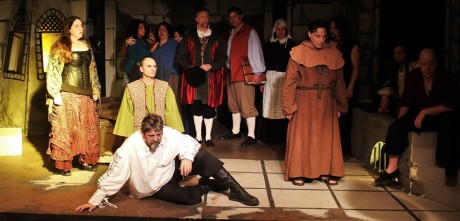
______
JOHN BROWN (DR CARRASCO/DUKE/KNIGHT OF THE MIRRORS)

Please introduce yourself and tell our readers where they may have seen you perform on the stage and other roles you may have performed.
John Brown hails from Upstate New York where he participated in numerous theater productions. In 2015, John joined the Arlington Players’ production of Peter Pan as a pirate, RMT’s Best Little Whorehouse in Texas as the Governor, and RMT’s Footloose as the high school principal.
Who do you portray in Man of La Mancha and how do you relate to your character? Does your character remind you of a friend or family member and how?
I play three roles in the show — the Duke, Dr. Carrasco, and the Knight of the Mirrors. I relate to each of them by determining their intentions throughout the play and exhibiting those intentions onstage by drawing from past personalities and behaviors I’ve encountered.
The musical surrounds one of the most influential characters in Spanish literature, Don Quixote. What do you admire most about him? Which scene or song that he and you perform is your favorite and why?
I admire Don Quixote because he is a good-hearted believer in all that is right and good. “The Impossible Dream” says this exactly.
What have been some of the challenges learning and performing your role? And how has Director Daniel Douek helped you with these challenges?
Learning and delivering lines can be a challenge because there are so many ways to say the same thing. Daniel and Assistant Director, Brian, have a great understanding of intention and are able to accurately convey this to the actors in the show.
What have you enjoyed most about this experience since beginning rehearsals?
I enjoy the process of seeing a mass of jumbled elements begin to make sense and take on a format that allows an audience escape from reality and enjoy a compelling and uplifting story.
The most famous and popular song in Man of La Mancha is ‘Impossible Dream.’ What have been some of your Impossible Dreams, and have these dreams come true?
There are no impossible dreams for me. Anything can happen if you let it.
If you had the opportunity to tweak or change your character, what would you do? If you could re-write the ending of this musical for your character, what would happen now to him/her?
I wouldn’t change a thing.
Why do you think Man of La Mancha is still so popular with audiences?
The messages of love, hope, truth, and all that is good continue to be important to people in today’s world. With all of the pain and sorrow that surrounds us, these provide a light in the darkness.
What does Man of La Mancha have to say to modern audiences and what do you want them to take with them after seeing this production?
It’s a message of hope. No matter how dark things become, we are loved by someone, tomorrow will be a better day, and truth will always prevail.
______
TRACY DAVIDSON (ANTONIA)

Please introduce yourself and tell our readers where they may have seen you perform on the stage and other roles you may have performed.
I’m Tracy Davidson and I am really pleased to have this opportunity to work with Laurel Mill Playhouse for the first time. I have performed in the MD/DC/VA district in both community and professional venues. Recently I performed the role of the Nightingale in Once Upon A Mattress at St Mark’s Miracle Players. I also was Aunt March in their production of Little Women. I played the role of Alcestis in Acelstis Dies and Lives an original work written by Tom Mallan and performed with Hope Operas. Previously, I worked with The Washington National Opera, Washington Concert Opera and was a Soprano section lead in Verdi’s Requiem for the The Washington Chorus performance with the BSO. Other venues include performances with Howard Community College, Victorian Lyric Opera Company, Feste Productions, National Philharmonic Chorale, and Wildwood Summer Theatre. I also received a degree in Vocal Performance and teaching from Syracuse University.
Who do you portray in Man of La Mancha and how do you relate to your character? Does your character remind you of a friend or family member and how?
In Man of La Mancha, I am playing the role of Antonia. For the most part, I actually feel like her polar opposite! Still, her attention to maintaining her uncle’s (Cervantes) estate and being assured that it stays with the family, particularly for herself, is something I can understand and relate to as a woman. Without a man in the household, Antonia would lose the estate, since women didn’t have the same rights as men in the 1600’s. She needs to get married in order to keep the inheritance. This is something I would concern myself with, if it were me in that day and age. Also, one day I might learn to be cunning like Antonia, but for now, I’ll just stick to my Jewish guilt when necessary!
The musical surrounds one of the most influential characters in Spanish literature, Don Quixote. What do you admire most about him? Which scene or song that he and you perform is your favorite and why?
Don Quixote De La Mancha is admirable for he epitomizes hope despite how reality bites big time! Is it really idealism or is it something else, perhaps? I think he made a choice to live in his dreams because of the comfort it provides to him. It’s an escape route despite the knowledge that it will all be over eventually. In the finale, reprise of “Impossible Dream,” we start out somewhat meak but with purpose and then it turns into something greater. Although, when he does his speech pontificating theories and philosophy earlier in the show, I am quietly in the background as my original character who is a prostitute and thief. My mind goes to thoughts of escape and wonder and perhaps even a sense of purpose momentarily.
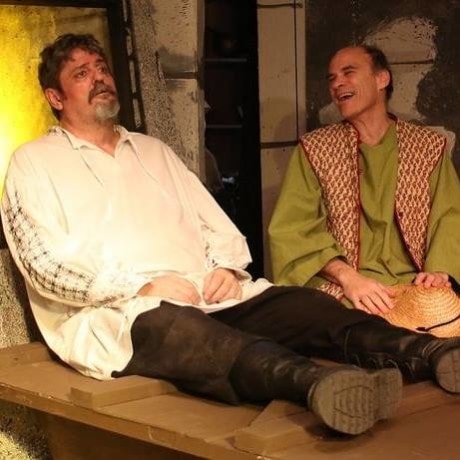
What have been some of the challenges learning and performing your role? And how has Director Daniel Douek helped you with these challenges?
The biggest challenge for me as Antonia is staying proper… well let me explain. I think she deserves an edge and Daniel is very supportive of me developing her character in a way that works for me. I think she has her moments where she gets erratic, but she always come back being calm, cool and collected, She has a purpose and is fairly simple, yet making her character come alive evolves mostly from her interactions with the other players. She does want things her way!
What have you enjoyed most about this experience since beginning rehearsals?
I love my scene “I’m Only Thinking of Him” and the reprise. It’s funny and fun and I get to work with three other extremely talented people who make their own roles come alive. Working on all the scenes with this entire cast has been a wonderful experience. Everyone is not only talented but also warm and friendly. This is a really nice group of people and I feel very fortunate to work with each and every one of them.
The most famous and popular song in Man of La Mancha is ‘Impossible Dream.’ What have been some of your Impossible Dreams, and have these dreams come true?
You want to know about my Impossible Dream. To be honest, it’s performing in this area. There are so many wonderfully talented people here in the MD/DC/VA area and to be cast is extremely difficult. You could talk to several people in theater, particularly women, and ask them how many auditions they go to in a 6 month period versus how many parts they get to play. I bet it’s about the same result as mine. My ratio is about 7 auditions to 1 part that I get offered to play. Often over a course of a year, I only get one role despite auditioning for many shows. So, I guess I’m living my “Impossible Dream” being here and doing this show for example. It’s all good because I’m in it for the long haul. Music is my passion, theater is my affair and sharing my gift is always extremely rewarding. How could I not continue to strive for that, especially when I get to make someone’s day happier while singing my face off? It’s so nice to know that with music and theater you are sharing a gift that can affect others in so many positive and wonderful ways.
If you had the opportunity to tweak or change your character, what would you do? If you could re-write the ending of this musical for your character, what would happen now to her?
I feel like if I could change Antonia, I would do that in a follow on story. The musical would end as it does but the characters all come back to life as the parts we played. We come to the conclusion that it was simply better that way and we were happier then. As Antonia, I am thinking about more than myself now. I think about other women and how they also don’t have the same rights as men. Despite first impressions, I take pity on Aldonza and hire her to work in the kitchen at the estate. Aldonza is able to bring the horse and mule with her, as well, since we have a proper stable for them. She shouldn’t live under those conditions near the Inn, I wouldn’t let my sister live there, if I had one.
Why do you think Man of La Mancha is still so popular with audiences?
I think Man of La Mancha speaks to both the inner child and the soul. Wouldn’t it be great if we could all escape from hardship and reality and enjoy ourselves? What if we could all dream about what could be and put aside our fears? We could invent grand things in our minds and create a stronger sense of purpose and have fun while we’re doing it. Sounds crazy right? Perhaps, but perhaps not.
What does Man of La Mancha have to say to modern audiences and what do you want them to take with them after seeing this production?
The question asks about a modern audience and what to take from this show. This show is timeless to me. It really doesn’t matter where or when the message is revealed. The message stays the same and I say that nothing is wrong with idealism to keep you going through life with all the hard things we have to face in our lives. I’m guilty of being an optimist and idealist myself. Does it show?! :)
______
RICHARD GREENSLIT (GOVERNOR/INNKEEPER)

Please introduce yourself and tell our readers where they may have seen you perform on the stage and other roles you may have performed.
My name is Rich Greenslit. I’m a former Air Force officer, returning to theater after a long absence. My past shows have all been with Silhouette Stages in Columbia, with roles as Franklin Hart Jr. in 9 to 5; John the Baptist/Judas in Godspell; Sir Bedevere in Spamalot; and Pap Finn in Big River.
Who do you portray in Man of La Mancha and how do you relate to your character? Does your character remind you of a friend or family member and how?
In Man of La Mancha, I’m portraying the Governor in the prison scenes, and the Innkeeper inside Cervantes’ tale. Neither one reminds me of anyone I know, in particular. However, I feel like we have all experienced those moments of anger, when we want to control the world around us; and those moments when we just want to participate in the human experience. These two characters span that range, but I think one point of the show is to bring those two viewpoints closer together.
The musical surrounds one of the most influential characters in Spanish literature, Don Quixote. What do you admire most about him? Which scene or song that he and you perform is your favorite and why?
We all make compromises to get through the day, the week, the month, the years. Don Quixote tosses this aside, and dares the world to take him as he is, with predictable and unpredictable results. The rock may always break the pitcher, but sometimes the pitcher leaves a mark on the rock. My favorite scene with Don Quixote is as the Innkeeper, where he first asks me to dub him a knight. The Innkeeper understands the situation Don Quixote finds himself in…however, he starts to glimpse something beyond that as well.
What have been some of the challenges learning and performing your role? And how has Director Daniel Douek helped you with these challenges?
I’ve played a number of angry characters, so the Governor comes more easily to me. The Innkeeper has been a challenge. Daniel is a terrific director; he lets you know if things aren’t working and provides suggestions about how to fix them, without dictating exactly how to do it. It’s a wonderful environment for creativity…
What have you enjoyed most about this experience since beginning rehearsals?
Performing is fun and exciting…but rehearsals are really my favorite part of doing a show. It’s the opportunity to try new things and discover new insights in a social environment So, it’s always about the people you are doing a show with, and I’ve had the fantastic fortune to meet and work with so many good people.
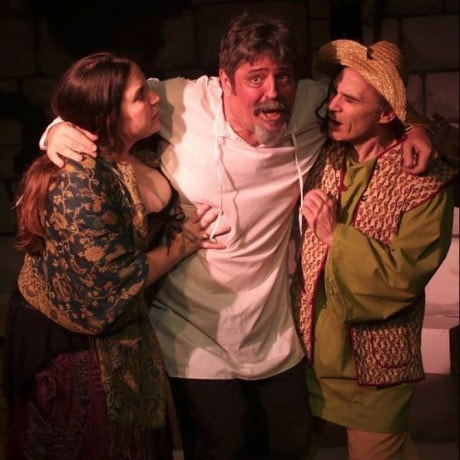
The most famous and popular song in Man of La Mancha is ‘Impossible Dream.’ What have been some of your Impossible Dreams, and have these dreams come true?
Paul Simon once wrote, “I don’t know a dream that’s not been shattered/or driven to its knees.” And Mark Knopfler of Dire Straits wrote, “When you’re young and beautiful/your dreams are all ideals/Later on it’s not the same/Lord, everything is real.” The exciting goals we have when we are young give way to realistic goals, and the mundane becomes fulfilling. I have a wonderful family; a job that is interesting most days; and a great hobby, so I think that’s pretty good. I would like to write a book someday.
If you had the opportunity to tweak or change your character, what would you do? If you could re-write the ending of this musical for your character, what would happen now to him?
I think a good chunk of the Innkeeper comes to live in the Governor, so I imagine him taking this hope back into the world, maybe changing his little slice of reality for the better. Less Blackbeard, more Robin Hood… without the tights.
Why do you think Man of La Mancha is still so popular with audiences?
Great music, great message.
What does Man of La Mancha have to say to modern audiences and what do you want them to take with them after seeing this production?
The message of Man of La Mancha is timeless: We live in a dirty world, yet we can all work to make our corner of it better.
______
JOSEPH MARIANO (PADRE/PRISONER)

Please introduce yourself and tell our readers where they may have seen you perform on the stage and other roles you may have performed.
I am Joe Mariano and have been performing in the area for several years now. I have played Beethoven in 33 Variations, George Bailey in Its a Wonderful Life (twice) and Fred in Miracle on 34th Street During the day I run a DC based trade association.
Who do you portray in Man of La Mancha and how do you relate to your character? Does your character remind you of a friend or family member and how?
I play the crazy prisoner who is then recruited to perform as Padre. Perhaps I should not suggest that the crazy guy reminds me of anyone! In fact, he shares characteristics that many “normal” people exhibit when agitated. The Padre is a Spanish priest, so I have based him upon the many Jesuits I have known through my life. I think he is a man of balance and contradiction – who wants his friend Quijana back, but who respects and admires the honor and goodness of Don Quixote. “There is either the wisest madman or the maddest wiseman in the world…”
The musical surrounds one of the most influential characters in Spanish literature, Don Quixote. What do you admire most about him? Which scene or song that he and you perform is your favorite and why?
Like Padre, one has to admire the nobility, goodness, and honor of Quixote. How could you not? Despite his naive and confused worldview his “impossible dream” is one we all share, is it not? Thus, Quixote’s song of the same name is my favorite.
Similarly, Padre’s song, “To each his Dulcinea” is a lovely recognition of both the the futility and beauty of Quixote’s impossible dream.
What have been some of the challenges learning and performing your role? And how has Director Daniel Douek helped you with these challenges?
It has been a while since I have sung in a production like this, so regaining a stage voice has been a true challenge (though a pleasant one). Daniel has been a great encouragement and it has been my goal to bring his vision to life.
What have you enjoyed most about this experience since beginning rehearsals?
Of course being around such a large and talented cast has been a pleasure. I must say at times I have been somewhat intimidated by the strength of this cast – their voices are beautiful. Nonetheless, to what their talent on display week after week has been a true joy and inspiration.
The most famous and popular song in Man of La Mancha is ‘Impossible Dream.’ What have been some of your Impossible Dreams, and have these dreams come true?
My experience has suggested that every dream one has is attainable – eventually. There is no impossible dream. I am fortunate that many of my dreams have been fulfilled and I am hopeful and confident that those that have not will yet come to be.
If you had the opportunity to tweak or change your character, what would you do? If you could re-write the ending, what would happen to him?
I would not be so presumptuous as to rewrite any author (s). Especially when their work has touched so many! I will leave the future of the crazy prisoner who plays Padre and the rest of the prisoners up to the imaginations of our audience.
Why do you think Man of La Mancha is still so popular with audiences?
Each time I see this show or hear its music, I cry. It is a moving and inspiring story, beautifully told, with soaring music. What audience could not appreciate that? The story of Quixote inspired people of the 17th century and hundreds of years afterward. Then Man of LaMancha inspired and entertained in 1965 and the decades since. It is no surprise that it continues to do so today.
What does Man of La Mancha have to say to modern audiences and what do you want them to take with them after seeing this production?
I trust that each audience member will come away with his or her own experience, but believing that no goal is too far, no star too high, and that no dream is impossible – even when it may seem that one is tilting at windmills
______
KEL McCLANAHAN (BARBER)

Please introduce yourself and tell our readers where they may have seen you perform on the stage and other roles you may have performed.
Fans of the Maryland theater scene may have seen me in the Rockville Musical Theatre production of Footloose (Coach Dunbar/Cowboy Bob) or the Potomac Theatre Company production of The Music Man (Marcellus Washburn). Fans of the DC theater scene have probably seen me playing a variety of roles in musicals, operettas, and straight plays put on by the Georgetown Gilbert & Sullivan Society over the last several years. Fans of the DC litigation scene (the most wonderful fans of all) may have seen me pretending to be a responsible adult in federal court.
Who do you portray in Man of La Mancha, and how do you relate to your character? Does your character remind you of a friend or family member and how?
I play both the Barber and one of the Muleteers. Of the two, I definitely relate more to the Barber, despite the fact that he is more challenging to play. He wears his emotions on his sleeve and gets more pure enjoyment out of simply living than most people get out of great accomplishments. Playing him is a license to let my inner child run rampant through the show.
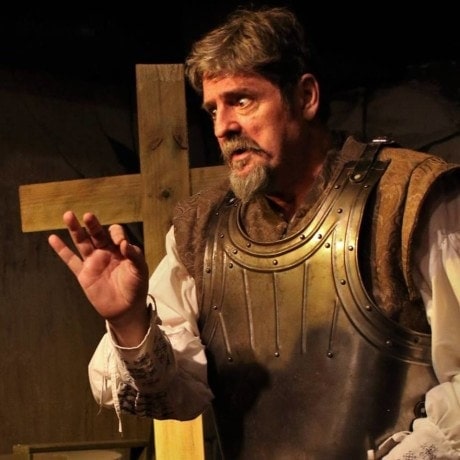
The musical surrounds one of the most influential characters in Spanish literature, Don Quixote. What do you admire most about him? Which scene or song that he and you perform is your favorite and why?
“Facts are the enemy of truth.” Don Quixote sees the world the way it ought to be, and refuses to let mere reality distort his vision. In doing so, he manages to bring reality closer to his fantasy, showing those around him that “the way things are” doesn’t necessarily have to be that way. He gladly takes up the gauntlet thrown down by George Bernard Shaw: “You see things; and you say ‘Why?’ But I dream things that never were; and I say ‘Why not?’ I don’t want to imagine a world where we aren’t encouraged to be more like Quixote.
If you had the opportunity to tweak or change your character, what would you do? If you could re-write the ending of this musical for your character, what would happen now to him?
Honestly, I like the Barber just the way he is. Where Dr. Carrasco is the dramatic antagonist to Quixote, the Barber is the comic antagonist. Both characters are placed in diametrically oppositional roles to Quixote, squarely focused on the objective, observable world and refusing to even entertain the idea of Quixote’s perspective, which makes Quixote’s triumph over them both a double victory. A good heroic myth balances comedy and tragedy, and a great one shows the hero prevailing in both arenas, cementing the message of the myth. Changing the Barber would upset the delicate balance.
Why do you think Man of La Mancha is still so popular with audiences?
The message is universal. Live your dreams, don’t let the world get you down, be the change you want to see in the world. Most of all, the “show within a show” demonstrates the transformative power of art to refresh even the bleakest existence.
______
CHRISTINE THOMAS-O’MEALLY (HOUSEKEEPER/PRISONER)

Please introduce yourself and tell our readers where they may have seen you perform on the stage and other roles you may have performed.
I am Christine Thomas. I recently returned to the Baltimore/Washington area after an unexpectedly long sojourn in my native Milwaukee. Since I’ve been back, I have portrayed Mother Abbess and Mrs. Paroo with Charm City Players in The Music Man, one of the Society in Edward II with Spotlighters, Marcellina in Marriage of Figaro at Carroll Summer Opera, and Mary Pickersgill in O’er the Ramparts at CCBC-Dundalk. Prior to my leaving the area, I sang with the Washington National Opera and was the Woman in Red in the world premiere of Dream of Valentino.
Who do you portray in Man of La Mancha and how do you relate to your character? Does your character remind you of a friend or family member and how?
I am playing the Housekeeper and a prisoner. As the prisoner, I am playing the character as a hard-bitten prostitute/smuggler, but my back-story is that she had been a devout Catholic girl who even thought of being a nun, but wound up falling in with the wrong crowd and being hurt over and over. She has lost her faith and has become bitter. When she asked to play the prim, self-righteous and pious Housekeeper, the character feels so foreign to her initially, but she gradually falls into the muscle memory of the rituals – crossing herself, praying the Rosary, going to confession – and by the end of the show, she remembers the comfort she had as a child in those rituals. I’ve known no one quite like the prisoner, although I have known a few people who have become very embittered toward their Catholic faith. The Housekeeper reminds me a bit of the housekeeper/sister of the Catholic priest I worked for in my first teaching job right after college, now that I think about it.
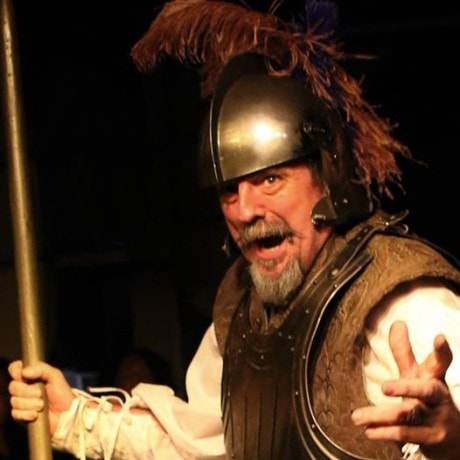
The musical surrounds one of the most influential characters in Spanish literature, Don Quixote. What do you admire most about him? Which scene or song that he and you perform is your favorite and why?
I admire Don Quixote’s ability to see the good and the shining in everyone beneath their exterior. I love all his songs – but I think Dulcinea has the most meaning for me. Possibly because I have taught it quite a bit to students (it was on the contest list in Wisconsin’s solo-ensemble festival) and because there was an episode of L.A. Law where a then-unknown Kevin Spacey sang it to his lawyer.
What have been some of the challenges learning and performing your role? And how has Director Daniel Douek helped you with these challenges?
Honestly, this role hasn’t been the difficult for me to learn. I have minimal dialogue – which can often be harder because you forget that you actually DO speak! and the music fits my voice quite well. I have found Daniel’s request for all of us to have a back story and to tell each other about that back story to be really helpful not only in fleshing out my character (I always write a bio for my characters anyway when I start working on them) but in knowing how the other people on stage have thought about their characters.
What have you enjoyed most about this experience since beginning rehearsals?
I am really glad to have had the opportunity to get to know the other cast members. I find them extremely supportive and positive, and there has been an excellent camaraderie.
The most famous and popular song in Man of La Mancha is “Impossible Dream.” What have been some of your Impossible Dreams, and have these dreams come true?
Since I was a little girl, I always wanted to perform in NYC. I had the opportunity to do that this past October, when I sang in a Leonard Bernstein tribute concert organized by a friend of mine with whom I’d gone to Peabody. I was the only non-New Yorker on the program, and I wound up singing 4 pieces!
If you had the opportunity to tweak or change your character, what would you do? If you could re-write the ending of this musical for your character, what would happen now to her?
How did you know I was writing Housekeeper: The Sequel of La Mancha? ;) I would like to have a little more opportunity to show how the experience of doing Cervantes’ play changed the prisoner (who I have named Consuela, by the way). I think I’m doing that in the finale, but it would be interesting to see how all the prisoners relate to each other after this experience. Will they go back to their old ways? Will they work together?
Why do you think Man of La Mancha is still so popular with audiences?
The theme of never giving up – the eternal quest.
What does Man of La Mancha have to say to modern audiences and what do you want them to take with them after seeing this production?
Nothing is out of reach if you believe.
Man of La Mancha plays through this Sunday, March 20, 2016 at Laurel Mill Playhouse – 508 Main Street, in Laurel, MD. The shows are SOLD OUT. To see if tickets are available, call the box office at (301) 617-9906, or purchase them online.
LINKS:
Meet the Cast of Laurel Mill Playhouse’s ‘Man of La Mancha’: Part 1: Fred Nelson.
Meet the Cast of Laurel Mill Playhouse’s ‘Man of La Mancha’: Part 2: Alan Barnett.
Meet the Cast of Laurel Mill Playhouse’s ‘Man of La Mancha’: Part 3: Mary Wakefield.
Meet the Cast of Laurel Mill PLayhouse’s ‘Man of La Mancha’: Part 4: John Brown, Tracy Davidson, Richard Greenslit, Joseph Mariano, Kel McLanahan, and Christine Tomas-O’Meally.
Ilene Chalmers’ review of Man of La Mancha on DCMetroTheaterArts.





